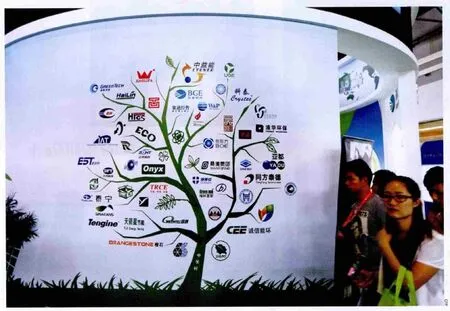Thinking Differently On Growth
2013-06-07GDPshouldnotbethefocusofdevelopmentByAnnLee
GDP should not be the focus of development By Ann Lee

The author is an adjunct professor at New York University and also the author of What the U.S. Can Learn from China
The constant scrutiny by Wall Street and policy makers of countries’ GDP growth can distort development incentives and result in disastrous unintended consequences.Clearly, for a country to prosper, suf fi cient economic activity must be generated in order to employ greater numbers of people and to improve the overall standard of living for society.However, GDP was developed as a measure decades ago, and it has many shortcomings that can make it a poor measure of quality of life.Instead, economists and policy makers should focus on other indicators and develop new models for measuring a country’s development progress which is possible with today’s technology and big data.
GDP is the sum of all the fi nancial transactions for products and services within a country’s borders. The first problem with this measure is that with many companies operating in multiple countries, the pro fi ts that accrue do not necessarily stay within a country’s borders. In fact, arguably a majority of the profits of multinational firms fl ows back to the country of origin so that even if China’s consumers spend a great deal in China, a large percentage of those profits will not accrue to anyone in China but to foreigners instead. For instance, Nike may hire Chinese workers to produce its shoes, have stores in China to sell its products, and only Chinese people buy from those stores. In essence, 90 percent of the economic activity happens in China and gets recorded in China’s GDP. However, the majority of the profits of Nike goes back to the owners in the United States even if none of the economic activity happens in the United States. The national wealth measure is distorted because it would seem that China is getting richer and the United States is getting poorer when the exact opposite is true.
Secondly, GDP does not show distribution of income. A company that creates a lot of income from production does not show how that income is being distributed.We know that the majority of profits accrue to very few individuals and that the income inequality is wide in China. A focus on GDP can make matters worse since it can encourage more production by certain wealthy individuals who do not share their profits generously with their employees which will hinder healthy economic development.
Another problem with GDP as a measure for economic progress is that it only captures financial transactions. When a parent takes his kid to watch a movie in a movie theater, that activity is captured in GDP. But when a parent takes the same kid to play soccer in a park, that activity is not captured in GDP. However, one can argue that going to the park to play soccer creates a better quality of life than going to the movies. The reasons are manifold:The parent can interact with the kid more directly; the kid gets more exercise; the parent and kid get fresh air; the parent and kid can make more friends playing soccer, etc.Thus, if the focus becomes overwhelmingly on GDP growth, policy makers would have more incentives to create more movie theaters than public parks and the quality of life for that society can go down as a result.

GREEN GROWTH: Visitors stop by the booth of Zhongguancun Science Park at the 13th China International Environmental Protection Exhibition &Conference held in Beijing on July 23. The park has 1,500 enterprises engaged in energy conservation and environmental protection
Of course, policy makers need to create the conditions for job growth and wealth accumulation in order for a society to raise its standard of living, and GDP growth can serve as a rough measuring stick. After all,what good is a public park if people are too poor to feed their kids? Movie theaters employ more people. This argument is certainly attractive except that the argument creates a false dichotomy. Policy makers don’t have a choice simply between parks and movie theaters. There are actually infinite combinations of how policy makers can help foster more jobs and also improve the quality of life even if the GDP is not growing as fast. For example, a city can build a park in which it hires people to keep the park clean. It can also have concession stands so that people can buy snacks at the park. It can have a stage where different groups perform in the park and charge admission. It can have a beautiful garden that attracts many tourists who will be willing to pay admission to see it. The park can raise the rents and prices of surrounding of fi ce buildings and homes. All these bene fi ts will come and raise the quality of life for the residents in the area, but the GDP will be sacrificed in the short run because these revenue streams and job growth will happen over a longer period of time than the building of a large movie theater.
The worst part about focusing on GDP is that it can actually create the conditions for a worse quality of life. The pollution that causes cancers, food poisoning, or birth defects actually adds to GDP growth because whenever people seek medical help and incur medical bills to pay for all these ailments, GDP grows. On the other hand, GDP doesn’t grow if people remain healthy and don’t seek medical help.Obviously, it is much better to have a healthier, cleaner society, but that can be at odds with creating higher GDP growth.
In summary, GDP can be used as a guidepost, but it should be considered alongside other factors and indicators that are important to developing a strong and desirable nation. Other measurements that should be allotted more room include the gross national product that allocates production based on ownership as opposed to location, the happiness index which measures satisfaction with life, median income rather than average income, air quality index, pollution index,and life expectancy. Furthermore, with the rise of big data, it is now possible to come up with algorithms that can further capture other nuances associated with a healthy economy. GDP has been relied upon because it is fast and easy to gather that data and make simple comparisons across countries. But because of its many shortcomings, policy makers would achieve their development goals faster if they used other metrics to measure their progress.
